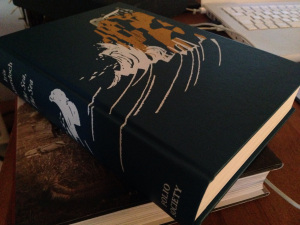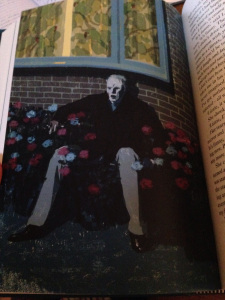I’ve just read ‘The Sea, the Sea’ in two long chunks over two days which left me with that sensation that you get after  consuming a really fine novel of being bigger, more important for having absorbed it. It’s a wonderful novel: an astonishing story, utterly unpredictable, of a self-important theatre director whose determination to retire is shaken by his obsession over the lost love of his life and who discovers too late that he’s missed the real loves and relations of friends of family.
consuming a really fine novel of being bigger, more important for having absorbed it. It’s a wonderful novel: an astonishing story, utterly unpredictable, of a self-important theatre director whose determination to retire is shaken by his obsession over the lost love of his life and who discovers too late that he’s missed the real loves and relations of friends of family.
It’s very good about art, particularly the theatre:
All art disfigures life, misrepresents it, theatre most of all because it seems so like, you see real walking a talking people.
And
Even a middling novelist can tell quite a lot of truth. His humble medium is on the side of truth. Whereas the theatre, even at is most ‘realistic’, is connected with the level at which, and the methods by which, we tell our everyday lies.
And,
‘The Theatre’ is an attack on mankind carried on by magic: to victimise an audience every night, to make them laugh and cry and suffer and miss their trains. Of course actors regard audiences as enemies, to be deceived,d rugged, incarcerated, stupefied.

It’s very good too on questions of age, retiring and living away from somewhere as big and vibrant as London:
I gave myself up to that not unpleasing slightly mad feeling that always comes over me when I enter London, the catering anonymous feeling of returning into oneself in the great tragicomic metropolis when the bond of society, whether in train or car, is suddenly snapped.
What really surprised me though, was that amid all the torment and tragedy there are some laugh out loud moments. That was unexpected. And when, at the height of his strange obsession, Charles Arrowby is thwarted by a mismatched house full of unwanted guests, that comedy becomes rather touching.
Oh and that strange, blink-and-you-miss-it supernatural element. I still haven’t worked that out.